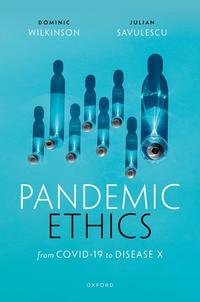Pandemic Ethics: From COVID-19 to Disease X
Press Release

Oxford University Press
Are we ethically prepared for Disease X?
1 May 2023
According to some estimates, there is more than a one in four chance in the next decade of another global pandemic. We don’t know whether this will be influenza, a coronavirus (like SARS and COVID), or something completely new. The World Health Organisation refers to this unknown future threat as “Disease X”.
Scientists are busy preparing. For example, the “100 day mission” involves the aim to develop a vaccine within 100 days of a new pandemic.
But we also need to be ethically prepared, say medical ethicists Professor Dominic Wilkinson, from University of Oxford, and Professor Julian Savulescu, from National University of Singapore, in a newly published book with Oxford University Press.
“Pandemics are fraught with ethical landmines”, writes Professor Wilkinson. “The scale of a pandemic means that we face awful choices. Many, many people become unwell, or vulnerable to illness at the same time. As we saw in COVID, we may not be able to treat everyone who needs a hospital bed, oxygen, a ventilator or a vaccine. We need to prioritise.”
“What is more, we may have to choose between the needs of those in our own country, and those overseas. Some of our deepest values conflict, for example our desire for personal freedom and need to protect the vulnerable.”
“During the COVID 19 pandemic, politicians said, ‘We need to follow the science’. But science can’t tell us whether we should have a lockdown, or mandatory vaccination. For that we need thoughtful, careful ethical analysis,” says Wilkinson.
“Pandemics raise the deepest ethical questions about the value of life, and how to weigh health against liberty. There is no simple formula.
“Modelling and policy aimed at one value in the current pandemic: minimizing death from COVID-19. But there are many values: avoid death from other causes, well-being and autonomy. How should these be calculated and weighed against each other?
“The risks presented by pandemics also affect different people differently. And policies place more burdens on some groups. How should the benefits and burdens be distributed, when they cannot be distributed equally? We were told, ‘We are all in this together’ and ‘No one is safe until everyone is safe’. These slogans obscure difficult ethical decisions which must be made and ought to be made transparently, ethically and responsibly.
“This book arms policy makers with some of the tools to make better decisions in the future,” says Professor Savulescu.
Savulescu and Wilkinson have assembled a group of international experts in philosophy, ethics, law and economics to review lessons from COVID-19 for future pandemics.
Some highlights
In the book, Professor Larry Gostin from Georgetown University criticises the way that global solidarity apparently collapsed during COVID-19 as countries prioritised their own citizens over all others. This contributed to the catastrophic global failure in vaccine roll-out with poorer countries experiencing prolonged delays in access. Philosopher Frances Kamm (Harvard) develops 12 proposals that may help debates about personal liberty in a future pandemic. She argues that even those with libertarian views should accept that relatively small harms can be imposed in order to save others lives. A group of economists and philosophers from the US and UK (including the London School of Economics) tackle the difficult trade-off between limiting the health impacts of a virus and maintaining economic activity. Authors from Brazil, Japan and India examine the intersection between politics and social inequality and identify some of the troubling consequences of decisions made during the COVID-19 outbreak.
Professors Dominic Wilkinson and Julian Savulescu.
Audio and Video
Interview with Professor Dominic Wilkinson, co-author Professor Julian Savulescu and contributor Professor Michael Parker.
Pandemic Ethics: From Covid-19 to Disease X. Author interviews
Audio recording of the introduction read by Professor Dominic Wilkinson
About the book
We are pleased to announce details of our latest publication 'Pandemic Ethics: From COVID-19 to Disease X'
Edited by Julian Savulescu and Dominic Wilkinson. The book is out today (1 May 2023), and published by Oxford University Press.
Key Features
Covers key ethical debates that arose during the COVID-19 pandemic
Includes contrasting perspectives from international experts in philosophy, ethics and economics
Identifies key lessons and suggestions for future pandemics
Funder
We acknowledge the support of the UKRI/AHRC: 'UK Pandemic Ethics Accelerator' (grant AH/V013947/1).
Links
Publisher website: https://global.oup.com/academic/product/pandemic-ethics-9780192871688?cc=gb&lang=en&
Further resources: see our UK Pandemic Ethics Accelerator page for podcasts, blogs, journal articles, reports and more.
Authors

|
Professor of Medical Ethics and Deputy Director of the Oxford Uehiro Centre for Practical Ethics, University of Oxford. |

|
Professor Julian Savulescu is Chen Su Lan Centennial Professor of Medical Ethics National University of Singapore, where he directs the Centre for Biomedical Ethics. |



